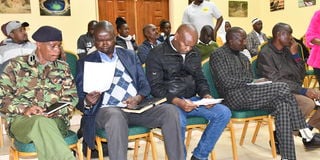Premium
Why Marsabit residents want reservists’ guns back

Marsabit Central police commander Johnson Wachira (left) and County DCI Boss Bethwel Oburu (second left) consulting during a peace meeting at Paradise on October 30, 2022. Security agencies were lauded for restoring peace in Marsabit County.
When the government withdrew guns from National Police Reservists in banditry-prone Northern Kenya in 2019, the move was deemed as one way of dealing with criminal gangs.
The NPRs were accused of working with criminals by lending them their weapons.
Marsabit County peace and cohesion director Jeremy Ledaany noted that immediately after the guns were taken, residents felt vulnerable and exposed to bandit attacks and started buying illegal guns.
“As a result of the confiscation of the NPR guns, this county saw an unprecedented proliferation of illegal guns in the hands of civilians who felt insecure and who desperately wanted to arm themselves, and the result of that was heightened interethnic conflicts and locals are now pleading for the return of the NPR guns,” Mr Ledaany said.
More illegal guns were procured, especially between 2020 and 2022, when intertribal clashes and banditry heightened in the region.
Mr Ledaany thanked the state for the security operation codenamed Rejesha Amani Marsabit that started in March 2022 for restoring calm and sanity.
He spoke during a peacebuilding meeting convened by the Northern Rangeland Trust (NRT) in Marsabit town.
He was impressed by the outcome of the operation, which has netted over 300 guns and over 2,000 bullets from civilians.
However, he maintained that some guns remained with civilians and urged the government to undertake another mass disarmament in all four sub-counties before reinstating the NPR guns.
Offer incentives
Mr Ledaany also wants the State to offer incentives to civilians holding illegal guns to surrender them.
He said the NPR guns played a critical role in protecting communities against banditry and urged the government to return them.
He warned that it would be tragic for the county to slip back to the dark days as residents grapple with the effects of drought.
NRT Marsabit County Director Dida Fayo lauded the community-driven peacebuilding initiatives that have seen the county slowly regain peace and security.
He attributed the gains to operation Rejesha Amani Marsabit.
He urged other partners to join hands and champion sustainable peace and cohesion.
He was optimistic that the county was on the right track to permanent reconciliation and healing, especially among the erstwhile antagonistic ethnic communities.
“Our core objective is to see that this county is never allowed to slide back to the dark days where bloodletting was the order of the day,” Mr Fayo said.
The NRT, security agencies, the National Cohesion and Integration commission, Interpeace International, and the Marsabit Interfaith Council and other partners agreed during the meeting to form a peace and cohesion technical working group to help avert duplication of peacebuilding efforts.
Fence-sitters
Former Sagante-Jaldesa MCA Adan Chukulisa, for his part, accused the local political class of being fence-sitters in the ongoing peacebuilding efforts, saying they were among those fanning interethnic clashes.
He appealed to the government to compensate those who lost property, and build homes for internally displaced people and offer them psychological counselling.
He also wants the government to give armed civilians incentives to surrender their illegally owned guns.
Mr Chukulisa also urged the state to return NPR guns, saying seizing them was ill-advised and was to blame for the mass procurement of illegal guns by civilians who felt vulnerable after the government’s move.
He wondered why NPR guns had been reinstated in other counties such as Samburu but not in Marsabit.
Marsabit Deputy County Commissioner David Saruni, responding to the pleas for the return of NPR guns, said the matter was under review.
He said the government was also committed to combating retrogressive cultures such as cattle rustling that could erode the peace gains.





